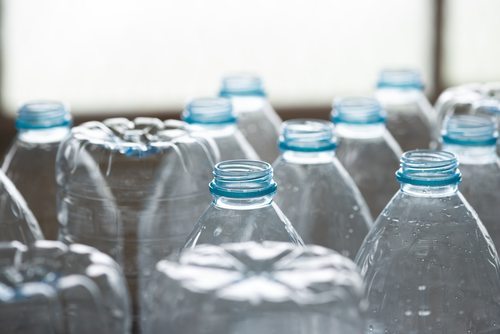 Advocates for national recycling legislation convened in the nation’s capital last week to promote a bill sponsored by U.S. Rep. Keith Ellison.
Advocates for national recycling legislation convened in the nation’s capital last week to promote a bill sponsored by U.S. Rep. Keith Ellison.

 Advocates for national recycling legislation convened in the nation’s capital last week to promote a bill sponsored by U.S. Rep. Keith Ellison.
Advocates for national recycling legislation convened in the nation’s capital last week to promote a bill sponsored by U.S. Rep. Keith Ellison.
 In a bid to reduce contamination in the recycling stream, California lawmakers have revised the state’s definition of polyethylene terephthalate (PET) to exclude the glycol-modified version of the resin PETG. The change means products made from the altered plastic are barred from using resin code No. 1.
In a bid to reduce contamination in the recycling stream, California lawmakers have revised the state’s definition of polyethylene terephthalate (PET) to exclude the glycol-modified version of the resin PETG. The change means products made from the altered plastic are barred from using resin code No. 1.
 Cartons, corrugate, expanded polystyrene, film and pouches are among the materials and products California officials say could be subject to mandatory packaging management rules.
Cartons, corrugate, expanded polystyrene, film and pouches are among the materials and products California officials say could be subject to mandatory packaging management rules.
 State recycling money is on the chopping block in Pennsylvania, the latest arena in which legislators look to draw from recycling support funds as a way to balance the state budget.
State recycling money is on the chopping block in Pennsylvania, the latest arena in which legislators look to draw from recycling support funds as a way to balance the state budget.
 California lawmakers have sent the governor a bill mandating that carpet stewards achieve a 24 percent recycling rate and discouraging the use of incineration. Meanwhile, carpet makers are sticking with their beleaguered stewardship group, instead of submitting alternative collection and recycling plans.
California lawmakers have sent the governor a bill mandating that carpet stewards achieve a 24 percent recycling rate and discouraging the use of incineration. Meanwhile, carpet makers are sticking with their beleaguered stewardship group, instead of submitting alternative collection and recycling plans.
 A proposal to cut the U.S. EPA’s budget by $528 million has cleared a U.S. House of Representatives committee, paving the way for a floor vote on the program-specific funding allocation.
A proposal to cut the U.S. EPA’s budget by $528 million has cleared a U.S. House of Representatives committee, paving the way for a floor vote on the program-specific funding allocation.

House lawmakers tasked with crafting a U.S. EPA budget are standing behind the agency’s waste minimization and recycling program, they wrote in a report this week.
 Funding for North Carolina’s state recycling support program has been largely preserved in a compromise budget approved by both legislative chambers last month.
Funding for North Carolina’s state recycling support program has been largely preserved in a compromise budget approved by both legislative chambers last month.
 A Canadian city brings in nearly $10 million through sales of recyclables, and a community attempts to educate residents to cut down on its costly contamination problem.
A Canadian city brings in nearly $10 million through sales of recyclables, and a community attempts to educate residents to cut down on its costly contamination problem.
Continue Reading
 Legislative movement on a pair of bills in the Hawkeye State has drawn recycling industry interest in recent days.
Legislative movement on a pair of bills in the Hawkeye State has drawn recycling industry interest in recent days.
